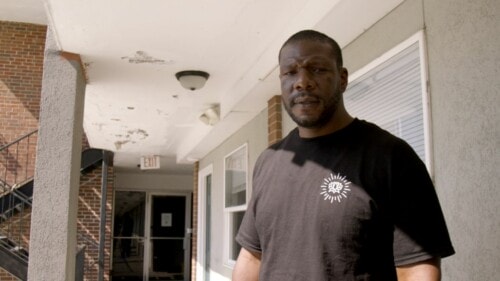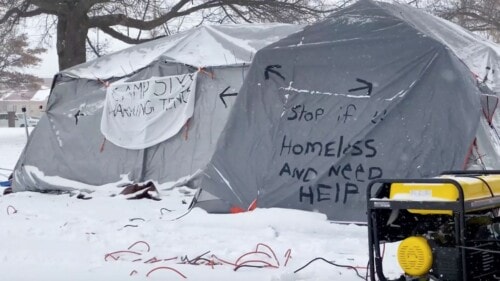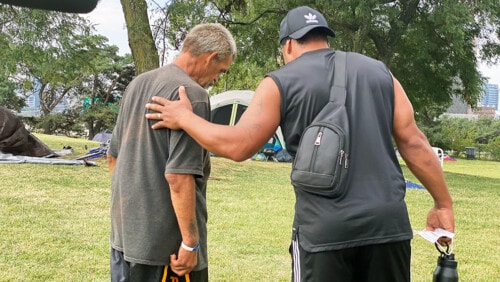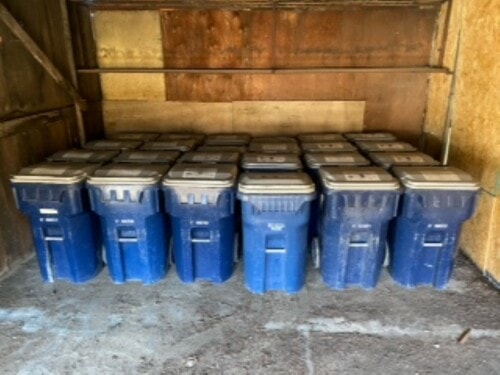Houseless Hotel: A ‘Housing First’ Solution for Those Without Homes Checking in With Lotus Care House
Published January 27th, 2022 at 6:00 AM
Above image credit: Lotus Care House is a 1970s era hotel that is being converted into transitional housing and a service center for the homeless. It is part of a "housing first" approach to addressing homelessness in Kansas City. (Mary Sanchez | Flatland)The mantras of Jamal Collier are reminiscent of “The Secret,” the best-selling book of positive affirmations championed by Oprah Winfrey.
He meditates. He focuses on his talents, envisioning happiness through a love of music.
Collier brings that vibe to helping the recently homeless find the path that he’s on – gaining more self-sufficiency through a new transitional housing program located in a former Kansas City hotel.
Even Winfrey might do a double-take at the nonchalance of Collier as he ticks through the markers of his life.
His first memory is of being taken from his mother at age 5.
“I remember sitting in like a doctor’s office,” Collier said. “I fell asleep. And when I woke up, I was in somebody’s else’s home. And then soon it was another house, and then another.”
One of those stops at a foster home was followed by a three-month stay at a Kansas City behavioral treatment center as a teenager. It was feared that he’d tried to overdose.
“Some people have been so traumatized, that’s all they can see of themselves,” Collier said.

There’s no mystery how his path devolved into problems with the law, and later becoming homeless.
“I was pretty good before COVID hit,” Collier said of his recent years. “Then, boom, I hit bottom.”
First, he lost a job as a waiter when the hamburger joint closed. Then he lost his car. A girlfriend left. And he was on the streets.
But now, Collier is one of the first residents and among the first hires of a new program to convert a 1970s era hotel into transitional housing.
Lotus Care House, named for the hospitality chain of the hotel’s owner, was formerly a Days Inn By Wyndham at 5100 E. Linwood Blvd. It is a prime local example of a “housing first” approach to providing shelter for the city’s burgeoning houseless population.
“I never thought that I’d be doing this,” Collier said of his new role as a community liaison. “But I love helping people.”
Volunteers and the current staff of four have been painting, replacing the old yellow and orange thumbprint with a more neutral gray/black, hand lettering signs on doors and the Lotus logo.
Welcome To Pet-Friendly Lotus Care House
The original check-in desk is a station for picking up blue surgical face masks and maybe a spritz of hand sanitizer. Around the corner, a microwave offers quick heat up for a snack from the table of grab-and-go meals.
This week, there were 22 people and two dogs staying in 15 rooms at Lotus Care House.
The fact that dogs are welcomed as guests is widely seen as an indicator of a new approach to put people in safe housing first, before attempting to address their larger issues. The area’s overnight shelters don’t generally accept animals. That fact alone can shut down avenues to other help for the houseless.
This year, partially spurred by previous missteps, area houseless and social service advocates are beginning to organize for the future – a day when people in dire need of shelter have access to adequate affordable housing.
The focus is on a building block approach, one that puts an emphasis on getting people into a transitional hotel room like the Lotus House first, then working to stabilize them for greater self-sufficiency.
Lotus Care House is another link in the chain of support for the housing. Plastic recycling bins, rebranded as Heart Carts, were recently introduced as a pilot project through the Downtown Council of Kansas City and the city. The bins are a small part of the broader efforts.
The goal is to offer a safe storage place for people’s personal items as a bit of a carrot. If a person is comfortable leaving some of belongings under such safekeeping, they’re more likely to accept other help, ranging from obtaining a new social security card, their birth certificate, a driver’s license, medical care, mental health assessments or signing up for whatever aid they can qualify for, especially federally funded housing vouchers.
They can also be assessed for possible placement at Lotus Care House, the former hotel.

Not everyone is ready for even that step.
“If your sense of identity is about experiencing homelessness on the streets, that can be difficult to leave,” said Alfredo Palacol, executive director of Lotus Care House.
In December, the City Council approved $400,000 for the program, an amount that will be paid out in reimbursements once contracts are finalized with service providers. Other grants are also being sought.
The hotel provides a bridge to those other services. Simply losing track of homeless people is an issue, as they are highly transient, almost by definition.
In fact, this year, an annual count of the houseless population will be delayed in Kansas City due to COVID.
The “Point-In-Time” count each January sends teams of volunteers and social workers out to take a census of people who are houseless. The data is then used to garner federal funding.
This year, it will occur March 2-3, when hopefully the omicron variant will be receding.
But the word is already out about Lotus Care House among those who need it.
A group of people are living in small tent city on a vacant lot just to the east of the hotel. The blue tarps and smoldering campfires offer a testament to the trust and safety building around the hotel, and also of overwhelming need.

Palacol keeps tabs on those people too.
One man with a room at Lotus Care House recently ran out to offer a can of soda to another much younger man slowly making his way toward the camp. The younger man was carrying a backpack, pushing a lawnmower with a metal suitcase and two fishing rods balanced on top.
Some of the Lotus guests work, rising early to catch the bus at the stop within eyesight of the hotel. One guest has their own car.
Another, Wayne Marcum, first met Palacol last year. Marcum was in a wheelchair at the time, living in a camp east of downtown often referred to as “Jurassic Park.”
Marcum is 60. He had a seizure in the hotel lobby last week and battles multiple health issues, some from the seven years that he’s been living on the street. Frostbite took several of his toes and steel crushed his leg, an injury from when he was trying to live in a salvage yard.

Both Palacol and Marcum have memories of the harried efforts when the cold wave hit Kansas City last year.
At the time, Palacol was still employed by Hope Faith Ministries, which offers meals, showers, laundry and a wide range of social services through its campus at 705 Virginia Ave. in Kansas City.
Bartle Hall was opened as a massive temporary shelter for the first three months of 2021 when sub-zero temperatures struck and a homeless man, Scott Eicke, died of exposure.
Thousands were sheltered there, with the wide-open hall being a safe place with sufficient spacing during the pandemic.
It closed in mid-March as spring approached. A car show had been booked. The city needed to return the hall to its original purpose.
But the public’s memory of homeless camps, repeated sweeps of those camps and Eicke’s death fueled an ongoing push for more dignified solutions.
Hotels were the next step. By the time Palacol was engaged to help, he said more than 400 people had been put in hotels around the city.
The word “chaos” is often used by homeless advocates to describe what happened. Rooms were destroyed without strong oversight and not enough social service workers were engaged.
As one experienced homeless advocate commented, “it’s not the way we would have done it.”
By comparison, Lotus Care House is more manageable.
Palacol spends his days assessing the guest’s needs, building trust and along with it, a sense of community.
Eventually, the space will be considered a “navigation center,” with agencies having offices there and a full range of aid like health care, mental health and help with long-term housing assistance.
“We have a blank canvas to try things here,” said Palacol. “We have an opportunity to try something different.”
A House First
The “housing first” model, along with navigation centers, require an attitude shift, as much as it does a realignment of programming.
Previously, there was an almost punitive approach to some programs helping the homeless. People had to be sober to gain entry to programs. They couldn’t have their dog. They had to be heterosexual. They had to be willing to accept Christianity as part of the programing. Or they had to have their life together enough already that they didn’t need much help to find a landlord willing to accept a housing voucher.
All of it equals barriers to Patricia Hernandez, administrative coordinator with the Greater Kansas City Coalition To End Homelessness.
She describes the old approach as “prove to me that you deserve it” before housing, in some cases even an overnight bed, would be offered.
The reality, advocates say, is that early traumas in a person’s life often leads to drug and alcohol use. Addictions, untreated and exacerbated by stress and mental health, can then lead to problems with education, employment and ultimately, the ability to afford a home.
Those issues are far easier to address, and to build life skills like budgeting, when someone has a safe place to sleep at night.
“Just give someone a home,” Hernandez said, “instead of seeing all of their other needs first and foremost.”

San Francisco is credited with developing the “housing first” model and navigation centers, beginning in 2015. Ten were eventually opened, with seven still in existence.
For a time, the Kansas City Council considered erecting a community of tiny pallet homes, like what currently helps previously unhoused military veterans. But the voices of NIMBY (Not in my backyard) scuttled the proposal.
Rob Santel, director of housing solutions with Cross-Lines Community Outreach in Kansas City, Kansas, is closely watching what is occurring on the Missouri side.
Eventually, the goal is to open a navigation center in KCK.
For now, Cross-Lines is operating the emergency warming center set up inside the old Jack Reardon Convention Center when the temperature dips below 25 degrees, a point where frostbite and hypothermia are at higher risk.
Small pup tents allow for safe spacing and privacy for people to sleep after they eat dinner. The tents, the safety of the site, is a respite from the brutal realities of living outdoors.
“The nighttime can be the most dangerous part of the day,” Santel said. “People will take meth to stay awake so that they can protect themselves.”
Santel said that about half of the 120 people housed in emergency shelters last year are now in stable housing.
Cross-Lines is also helping to pilot an app called the Show Me The Way that is looked to as a “gamechanger” for better coordinated services around the region.
Information is taken from people experiencing homelessness – their location, needs, what help they might qualify for, such as a housing voucher – and then shared among social service providers.
Some police officers in Kansas City were recently trained to use it, as they often interact with people who are homeless. The data is gathered and accessible by local agencies, so that cases can be categorized, priority given to some and services coordinated.
Other outreach is also done in cooperation with police, with social service workers going out with KCK police every Wednesday to connect with people who aren’t visiting the cold weather shelter.
“This is one of the best examples of collaboration,” Santel said of the latest efforts on both sides of the state line. “The community is really stepping up to make things happen.”
Mary Sanchez is senior reporter for Kansas City PBS.






